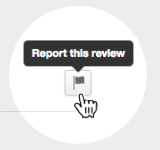
This blog focuses on the discussion regarding the most popularly used review websites for healthcare, what are their general terms and conditions regarding review reporting, and what's the process for that on each of these websites.
Negative reviews do happen sometimes.
And, the best way to tackle them is to respond to them politely and personally.
Seeing their concern addressed, your angry patients (in reciprocity) may change or even delete their bad reviews. But responding for addressing the concerns is good when negative reviews are true to their claims.
How do you think you'd respond to a negative review that's false or faking a story? It's possible! Sometimes, it may be an infuriated patient who writes a false review over-analyzing or over-emphasizing the story. At other times, it may be a jealous competitor, a previous employee, or someone else spamming your review profile with fake content.
Reporting or flagging those objectionable content on review sites (Google, Yelp, Facebook, HealthGrades, Vitals, etc.) is the most convenient way for doctors and practice managers to get rid of them.
It takes less effort (just few clicks), and guarantees favorable results – so long you can provide credible arguments. You may try some other options like confronting by posting the right details, or complaining with the authorities, but let me assure you here that those are not the best options for tackling with fake reviews.
The only way to prove a fake story untrue is to give out the right details.
But there lies the trap! That's reality!
Sometimes, it may be an infuriated patient who writes a false review over-analyzing or over-emphasizing the story. Other times, it may be a jealous competitor, a previous employee, or someone else spamming your review profile with fake content.
There's more to HIPAA privacy guidelines!
Suppose an angry patient complains (on Google, Facebook, Yelp, etc.) that he wasn't treated appropriately, and even discloses his health information to simply assert on his point. Even in that case, the physician cannot use that already disclosed health information to explain why he chose the treatment.
Leave explaining, a simple apology from the physician will be seen as a confirmation to those details, which is the same as disclosing it by yourself, says HIPAA.
Perhaps, you may consider filing a lawsuit against your patients who wrote those fake and defaming reviews. But I'm sure you would not choose that path. Here's why:
Review reporting is easy but it doesn't always guarantee that the reported review will get removed.
That's because review websites cannot agree to either side of the story; yours or your angry patients'. Also, their review policy doesn't allow them to simply delete their own user's reviews, until and unless they violate their website's review guidelines.
Yes, you heard it right...there are certain types of reviews that can be removed!
No matter whose side of the story is true, review websites will most happily remove those reviews that violate their terms and conditions or guidelines. Knowing the respective site's terms and conditions will let you:
“As the review websites' are generally immune from liability for decisions to leave, or to remove, content posted by their users under the federal law, they can agree to take it down without fear of legal repercussions if they find your argument credible.”
For reviews which you can't get removed, you can still lessen their impact by personally contacting the angry patient and talking over their issue with them. After resolving their issues, you can politely ask your angry patients to remove or change their review. They'll most likely do it!
Related blog: Dealing with Unhappy Patients: How to Retain a Healthy Relationship
There are hundreds of review websites in America, but only few of them are important enough to leave any impact on your healthcare business through the reviews posted on them. Here are some in order of their importance:
We'll discuss the review policies of each of these websites, and how you can report reviews on them.
It's very hard to get reviews removed from Google, however, it's possible if the questioned review either violates the Google's review guidelines, or if the questioner (the practice or provider) can submit a court order to Google for removal of review (which isn't the best way of course).
Before knowing about how to flag a Google review, take a look at the gist of the applicable section of the review policy laid down by Google:
Steps to flag fake reviews on Google My Business
Desktop

Mobile

Nothing specific to reviews have been laid down by Facebook.
Facebook's community standards decides about the fate of the reported content or a review. It doesn't lay down hard and fast rules for reporting an objectionable content. They are more like open to interpretation, and the company clearly states that in some cases, the company may not find things inappropriate just because you find them disagreeable or disturbing.
Even so, many things are quite obvious regarding content sharing policies in the Facebook's Community Standards. If you want to take a review down on Facebook, the review should satisfy one of the following conditions:
Steps to dispute reviews on Facebook
Yelp is somewhat similar to Google in terms of reviews reporting services. In order to get a review removed from Yelp, the review in question should violate their Content Guidelines or its Terms of Service. To summarize, a review should violate one of the following to get it removed:
If you don't like a review, and think that it also violates the Content Guidelines or Terms of Service of Yelp, just click the flag icon at the right of the review in question and that's it.

On the Yelp for Business Owners app,

Yelp team will review if the review actually violates the guidelines or not. If yes, the review will stand removed. Only the owner of the review page can flag a review on Yelp.
HealthGrades does not have text reviews so you don't actually have to worry a lot about it.
It shows only the star ratings that represent a total score by patients based on different criteria. Just take care of the repeated submissions of ratings by patients as it may bias your total calculated score. If you feel that your profile may be spammed, you can reach out on info@healthgrades.com to voice your complaint.
Getting a review removed is the easiest on Vitals. You can report the review and also connect with the team to explain the matter in detail. First, let's have a look at the conditions that need to be met for a review to be removed:
Just click on the “report abuse” next to the review with which you have issues. You can also reach out on support@vitals.com to further explain the matter. If still the reviews are there, you can hide any two from showing upfront. Sometimes, it becomes difficult to differentiate between a negative review and a fake review.
It's better to have a proactive healthcare reputation management system, in place to constantly monitor your online reviews, and let you identify the bad reviews before they get posted. Schedule a personal live demo or call us at 866-246-7891 to understand how RepuGen will help you eliminate fake reviews and address negative reviews.
0 Comment
Your email address will not be published. Required fields are marked *